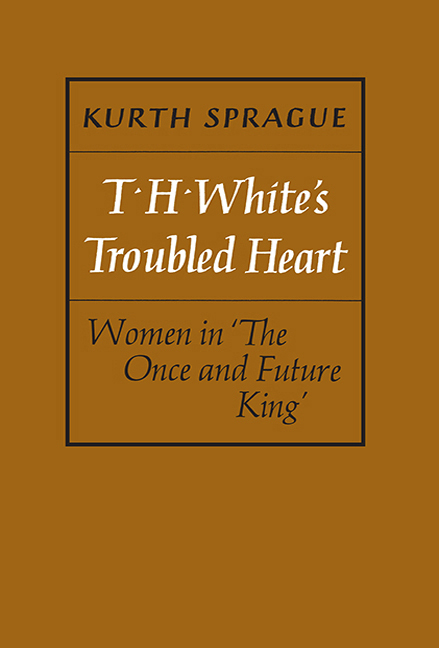Book contents
- Frontmatter
- Dedication
- Contents
- Miscellaneous Frontmatter
- Acknowledgements
- Foreword T. H. White Holdings at the Harry Ransom Center
- Preface
- Introduction
- Chapter One T.H. White
- Chapter Two Constance White
- Chapter Three White's Sources
- Chapter Four Omitted and Minor Characters
- Chapter Five Morgause
- Chapter Six Guenever
- Conclusion
- Appendixes
- Notes
- Survey of Criticism on White
- Bibliography
- Frontmatter
- Dedication
- Contents
- Miscellaneous Frontmatter
- Acknowledgements
- Foreword T. H. White Holdings at the Harry Ransom Center
- Preface
- Introduction
- Chapter One T.H. White
- Chapter Two Constance White
- Chapter Three White's Sources
- Chapter Four Omitted and Minor Characters
- Chapter Five Morgause
- Chapter Six Guenever
- Conclusion
- Appendixes
- Notes
- Survey of Criticism on White
- Bibliography
Summary
It was as a doctoral dissertation that an early version of this book, published in revised form from ARTHURIANA 16.3 (Fall 2006), first saw the light of day in 1978. When I wrote it I thought that if I had nothing of earth-shattering moment to say about T.H. White and his attitudes toward women—it seemed to me that his biographer had pretty thoroughly scouted out the terrain in that direction—I might at least bring additional proof to bear that would substantiate her views.
I was excited by being permitted to use White's journals and diaries as well as his note-laden books from his library in Alderney; to my delight one of these turned out to be the actual copy of Malory upon which White relied when he wrote The Once and Future King.
While writing my dissertation, I naturally examined extant White criticism, making use of what seemed meet for my purposes. I have expanded this list here. (See ‘Survey of Criticism on White.’)
I wanted to know not only how White's idea of an omnibus Arthur evolved, but how he regarded the problems arising from the profound differences in tone from the springtime lyricism of the initial volume, The Sword in the Stone, to the melancholy, elegiac tragedy of the final Candle in the Wind.
What clues did he find in Malory that prompted his ideas for such brilliant characterizations? What of TOAFK was White's invention? If invention, what was its likely ultimate inspiration? At the same time I was curious about White's depictions of women in his story, and what he did with those women already present in Malory's pages. In other words, my main concern, I freely admit, was with what a twentieth-century novelist saw to use in a fifteenth-century source.
With the passage of thirty years, a good deal has appeared in print on White and his writing. Yet, when reviewing what I wrote all those years ago, I have found little that I want to change. Scholars of the last generation have made important additions to White studies. Three whose work is essential to an appreciation of White: François Gallix, whose comprehensive and meticulously researched T.H. White: An Annotated Bibliography is an immense scholarly contribution to any serious student of White's life and writings.
- Type
- Chapter
- Information
- T. H. White's Troubled HeartWomen in <I>The Once and Future King</I>, pp. xiii - xviiPublisher: Boydell & BrewerPrint publication year: 2007



